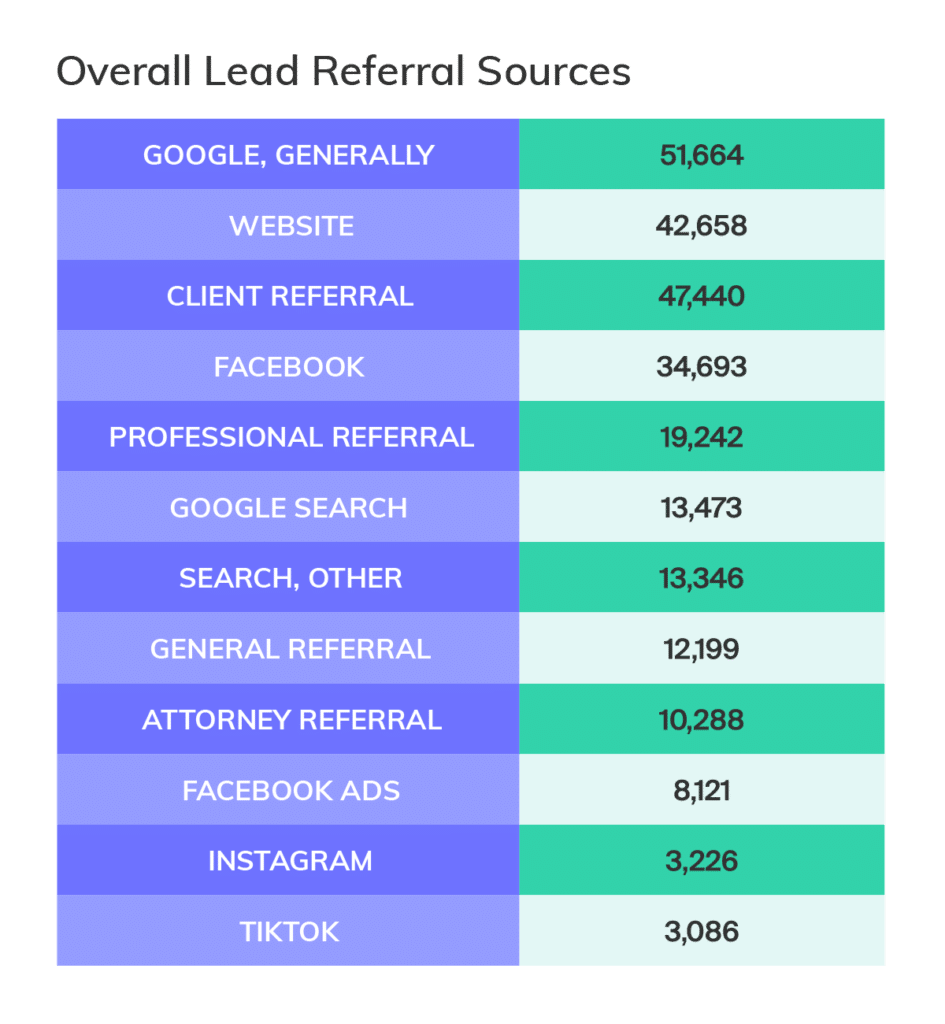Social Media for Law Firms: The Strategic Guide
By Gabriela Jhean
Feb 15, 2024
| 10 min read
With over 4.95 billion people using social media in 2024, is your law firm making the most of client-generating social platforms?
Social media is a powerful tool for lawyers to introduce their firms to new audiences and expand their client base. However, amid tight schedules and never-ending workloads, it’s easy to disregard its potential.
This guide explores how lawyers can leverage social media effectively to boost their online presence and attract more clients. We’ll also cover social media best practices for creating content that converts prospects into clients.
What Is Social Media Marketing for Law Firms?
Social media marketing for law firms is the strategic use of social media to:
- Promote legal services.
- Engage with potential and existing clients.
- Build a robust online presence.
This marketing strategy involves creating and sharing content that resonates with your target audience.
Social media content refers to the myriad of posts, videos, photos, and articles people share across platforms such as Facebook, Twitter, Instagram, and LinkedIn.
By creating unique content and repurposing existing pieces, you’ll develop a well-rounded content marketing strategy that builds credibility and fosters trust in the legal space.
What Are the Benefits of Social Media for Lawyers?
According to ABA’s 2023 Website & Marketing Tech Report, 84% of law firms use social media to market their practices.

The following benefits explain why.
Gain New Clients
Social media is a great way to humanize your practice. It’s easy for clients to get lost in legal jargon, so social media can help you connect with your audience in a more meaningful way and pique their curiosity about your firm.
Here are some ways you can creatively use social media to showcase your expertise and position yourself as a trusted authority:
- Write a blog that shares professional insights on recent legal hot topics.
- Post a video explaining a technical aspect of your practice in simple terms.
- Address common legal queries about hiring a lawyer.
- Sharing success stories from your firm.
Now, let’s look how this type of content can result in a conversion. We’ll use a LinkedIn post as an example.
- You share a LinkedIn post promoting a blog on your website about how to find a personal injury lawyer.
- This blog post has a call to action (CTA) to sign up for a free consultation with one of your firm’s personal injury lawyers.
- The user contacts your firm.
- You speak with the prospective client, demonstrate your expertise in personal injury cases, and win a new client.
Grow Your Network
In the digital age, networking transcends geographical boundaries, and social media platforms offer lawyers an expansive virtual space to connect and collaborate. Beyond merely expanding your professional circle, leveraging social media for networking can provide a myriad of benefits:
- Diverse Perspectives: Connecting with legal professionals across the globe exposes you to diverse perspectives and approaches to legal issues. Engaging with colleagues from different backgrounds and jurisdictions broadens your understanding of the law and enhances your ability to navigate complex legal challenges.
- Knowledge Sharing: Social media facilitates the sharing of knowledge and expertise within the legal community. Whether it’s discussing recent case law, sharing insights into emerging legal trends, or exchanging practical strategies, participating in online legal discussions allows you to stay informed and up to date on developments in your field.
- Continuing Education: Networking on social media provides opportunities for continuous learning and professional development. Engaging with legal experts through webinars, workshops, and online forums enables you to access valuable educational resources and stay abreast of industry best practices.
- Strategic Alliances: Building relationships with potential collaborators and strategic partners can lead to new opportunities for growth and expansion. Whether it’s forming alliances with complementary legal professionals or partnering with organizations in related industries, social media networking can foster mutually beneficial relationships that advance your firm’s goals.
- Referrals and Recommendations: Cultivating a strong network of connections on social media increases the likelihood of receiving referrals and recommendations from colleagues and peers. Positive interactions and endorsements from trusted professionals enhance your firm’s reputation and credibility, positioning you as a preferred choice for clients seeking legal services.
Build Brand Awareness
Brand awareness refers to how familiar people are with a particular brand, its product, and/or services. The higher the brand awareness, the more well-recognized and trusted you are.
Digital marketing’s expansive reach can be a game-changer for law firms looking to grow their name in the legal space.
Law firm social media marketing enables you to consistently engage a wider audience, fostering familiarity with your brand over time. This ensures that when a legal need arises, your firm will come to mind.
What Are the Top Social Media Platforms for Lawyers?
When navigating the social media landscape, lawyers should focus on platforms that align with their professional goals and target audience.
Let’s explore five key platforms ideal for legal professionals:
LinkedIn is the most popular social media platform for law firms, with 83% of firms using it in 2023. Lawyers can showcase their expertise, connect with colleagues, and participate in industry discussions. Its business-oriented environment makes it ideal for building a credible professional presence.
According to Statista, 60% of LinkedIn users are between the ages of 25-34. 18 to 24-year-olds come in second at 21.7%; and users between 35-54 are 15.4%.
Facebook is the second most popular, with 57% of law firms reporting they have a Facebook business page. However, according to the LawPay & MyCase 2023 Benchmark Report, Facebook is the top social platform for generating leads for lawyers.
And with over 2.09 billion users on Facebook every day, there’s never been a better time to tap into this platform’s potential.

With its vast user base, Facebook offers lawyers a diverse audience. However, men between the ages of 25 and 34 make up its biggest audience.
On Facebook, you can share firm updates, articles, and engage with the community from your business page. It’s a versatile platform that even allows you to run targeted paid campaigns. You can leverage law firm advertising to boost user engagement and brand awareness.
To learn more, here’s an article about Facebook advertising for lawyers.
For a creative approach, Instagram is an excellent platform for sharing images and videos. You can create behind-the-scenes glimpses of your legal practice, share educational infographics, and more. Its visual nature is effective for building your brand image. Also, it’s a great platform for engaging a younger audience on a more casual level, considering how over half of Instagram users are 34 years old and younger.
YouTube
If you’re looking to stand out, video is a powerful medium. According to the earlier tech market study by ABA, only 30% of law firms use video content to engage their audience. This is a missed opportunity for many lawyers, considering how viewers retain 95% of a message conveyed in videos compared to only 10% from text.
YouTube is the most popular video platform, particularly among Millennials. According to a study by Comscore and YouTube, 35% of Millennials use YouTube as their preferred video content provider.
Lawyers can utilize videos to share content such as:
- Educational series
- FAQ sessions
- Webinars
- Legal updates and trends
TikTok
It’s worth noting that if you choose to create video content, TikTok is another platform to explore.
TikTok is known for its short-form video content and presents a unique opportunity for lawyers to engage with a younger audience (36.7% of users are between the ages of 18 and 24.) While it may seem unconventional for legal professionals, TikTok offers a creative and dynamic platform to share legal insights, debunk myths, and provide practical advice in a concise and entertaining format.
For further reading, here’s a helpful guide on TikTok for lawyers.
Social Media for Law Firms Best Practices

When every post holds the potential to shape your firm’s image, adopting law firm marketing best practices is paramount.
Let’s look at five steps for optimizing your law firm social media strategy.
1. Set Goals
Define clear objectives for your social media efforts. Having specific goals will help tailor your content and measure success.
Your goals may look like the following:
- Expanding your client base
- Increasing brand awareness
- Establishing thought leadership
2. Research Competitors
Stay informed about your competitors’ social media presence for a competitive edge. By knowing what other law firms are doing in the social media space, you’ll:
- Identify successful strategies.
- Learn from their engagement tactics.
- Find unique ways to differentiate your firm within the legal landscape.
3. Create High-Quality Content
Quality triumphs over quantity when it comes to content creation. Craft content that reflects your expertise and resonates with your target audience for maximum engagement.
Whether it’s sharing insightful legal articles, thought-provoking case studies, or visually appealing graphics, prioritize content that showcases your legal prowess and provides genuine value to your followers.
Consistently delivering informative and engaging content builds credibility and trust, establishing your firm as a go-to source within the legal sphere. It can also be seen as a form of reputation management for lawyers.
Ultimately, your content and overall online presence need to align with the high standards of the legal profession.
4. Develop a Content Calendar
Consistency is key in the realm of social media for law firms. Plan and schedule your content in advance to maintain a steady and reliable presence. A well-organized content calendar ensures a cohesive narrative, keeping your audience engaged.
5. Look at the Analytics
You’ll want to regularly analyze social media analytics to gauge the effectiveness of your strategy and ensure it aligns with your goals to grow your law firm.
Here are some key metrics to monitor:
- User Engagement: Measure the level of interaction with your content through likes, comments, and shares. A high engagement rate indicates that your audience finds your content valuable and interesting.
- Reach: Evaluate the total number of users who have seen your content. Monitoring reach helps assess the visibility of your social media posts.
- Follower Demographics: Understand the characteristics of your audience, including age, location, and interests. Tailoring your content to match your audience’s preferences enhances engagement.
- Click-Through Rate (CTR): Track the percentage of users who clicked on a link within your post. A higher CTR indicates effective calls to action and audience interest in your offerings.
- Conversion Rates: Analyze how many social media interactions lead to desired outcomes, such as signing up for consultations or accessing your legal services.
Final Takeaways
At the end of the day, implementing a strong social media strategy can help grow your practice. After all, the more visible you are online, the easier it is for prospective clients to find you and convert to paying customers.
To seamlessly integrate social media efforts with lead management, MyCase offers a cutting-edge legal CRM solution and lead intake software for lawyers.
MyCase’s CRM features empower you to track, manage, and convert new client prospects efficiently. From initial contact to conversion, the platform streamlines the process, ensuring no potential client falls through the cracks.
Sign up for a free 10-day trial to discover how MyCase can help your firm thrive in the digital era and grow your client base.


